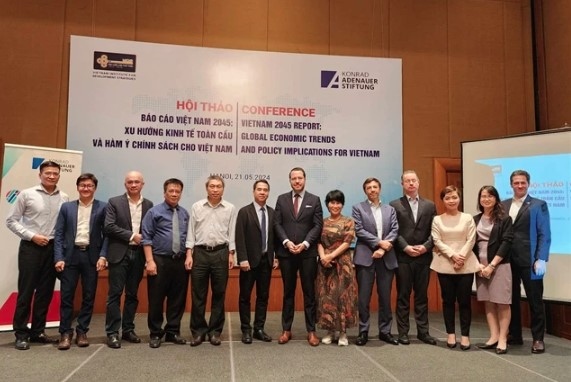New 'Vietnam 2045' report aligns with the country's extended vision
Vietnam has set its sights even higher, aiming to become a high-income country by 2045 and a decarbonised economy by 2050 — ambitious goals that demand innovation and strategic visions.

That was a remark by Florian Feyerabend, Resident Representative of the Konrad Adenauer Stiftung Vietnam, at the conference 'Vietnam 2045 Report: Global Economic Trends and Policy Implications for Vietnam' on May 21.
He said the Vietnam 2045 Report contained valuable assessments and policy recommendations that has guided Vietnamese policymakers in shaping the country's trajectory over the past few years.
However, shifts in geopolitics, technology and global trends have reshaped the reality of the country's path towards economic growth, exposing the need for a new report aligning with its extended visions.
"The Vietnam 2045 Report will serve as a compass for Vietnam's train," said Feyerabend.
Tran Toan Thang, Head of the International Issues Department at Vietnam Institute for Development Strategies (VIDS) under the Ministry of Planning and Investment, underlined several global trends that would have a big impact on Vietnam in the coming years, including competition between the US and China as well as a transition to renewable energy.
Technology development, he said, also plays a role in shaping Vietnam's digital landscape in the next decade. Under his estimation, Vietnam is on par with China and the US in terms of vision and data availability.
"However, Vietnam still lags behind the two superpowers in terms of technology maturity, adaptability, human capital and innovation capacity," said Thang.
Nguyen Quoc Truong, Vice President of VIDS, said Vietnam needs a new report in place of the Vietnam 2035 Report to capture recent changes in global and domestic context.
He said the Vietnam 2045 Report is under development and will consist of nine chapters: Review development path and targets; New context and trends, new visions; Science and technology, innovation, autonomy; Global value chains upgrading, private sector development; Spatial transition, growth dynamic poles, connectivity; Human resource and labour shifting; Green and climate change responses; Social transition; and Institution for development.

